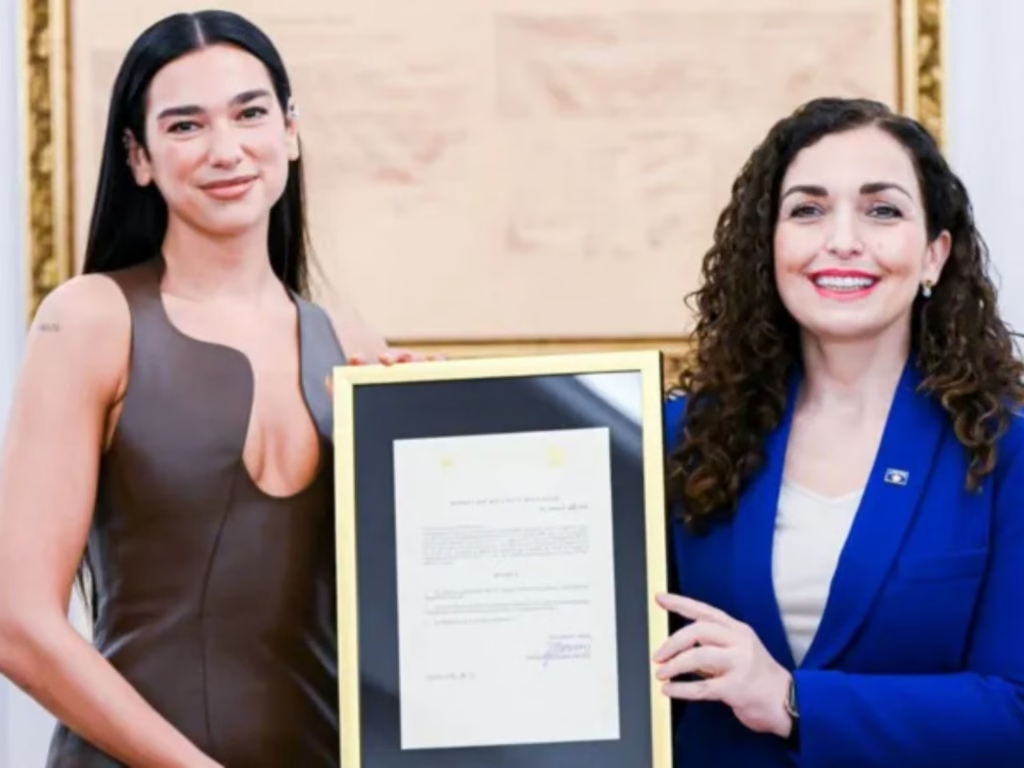
Dua Lipa, born on August 22, 1995, in London, England, is a global pop sensation whose real name carries profound cultural significance tied to her Kosovo Albanian heritage. Her name, “Dua,” meaning “love” or “prayer” in Albanian, was chosen by her grandmother, reflecting the family’s deep-rooted connection to their Albanian identity. As the daughter of Kosovar Albanian parents who fled conflict in the 1990s, Lipa’s life and career are steeped in the cultural legacy of Kosovo, which she actively promotes through her music, advocacy, and philanthropy.
The Meaning Behind Dua Lipa’s Real Name
Dua Lipa’s full name is indeed Dua Lipa—no middle name, no stage name, just the authentic moniker given by her family. The name “Dua” is of Albanian origin, translating to “love” or “prayer” in the Albanian language, a choice suggested by her maternal grandmother, who is of Bosniak descent. This name reflects the warmth and spiritual resonance of Albanian culture, where names often carry deep emotional or familial significance. Her surname, Lipa, is a common Albanian name, tying her to her ancestral roots in Peja, Kosovo, where her family’s history is traced. Unlike many celebrities who adopt stage names, Dua’s choice to use her real name underscores her pride in her heritage and her commitment to authenticity.
Lipa has shared in interviews, such as one with The Guardian in 2018, that her name is a source of pride but also posed challenges growing up in London. She once considered changing it to something more anglicized, like “Amber,” but ultimately embraced “Dua” as a unique marker of her identity. This decision reflects her journey of reconciling her British upbringing with her Kosovar Albanian roots, a duality that defines her cultural narrative. Her name has also inspired a trend, with the UK’s Office for National Statistics noting a rise in babies named “Dua” in England and Wales, from 63 in 2017 to 126 in 2019, coinciding with her rise to fame with hits like “New Rules.”
A Family Shaped by Kosovo’s Turbulent History
Dua Lipa’s connection to Kosovo is deeply personal, rooted in her family’s experiences as refugees during the Yugoslav conflicts of the 1990s. Her parents, Anesa and Dukagjin Lipa, fled Pristina, Kosovo, in 1992 as tensions escalated, settling in London’s Camden area. Anesa, of Bosniak and Albanian descent, and Dukagjin, a Kosovar Albanian and former rock musician in the band Oda, instilled a strong sense of Albanian identity in their children despite their displacement. Lipa’s paternal grandfather, Seit Lipa, was a prominent historian and head of the Kosovo Institute of History, who lost his job for refusing to rewrite Kosovo’s history to align with Serbian narratives during the conflict.
This family history of resilience and cultural pride profoundly influenced Lipa. Growing up in a household where Albanian was spoken alongside English, she was immersed in Kosovar traditions, music, and stories of her homeland. As she told Vanity Fair in 2021, “Everything was Albanian at home, and English was my school life.” This bilingual, bicultural upbringing shaped her worldview, blending Western pop influences with the pride and patriotism of her Kosovar roots. Her father’s musical background, playing artists like David Bowie and Bob Dylan at home, further inspired her career, but it was her connection to Kosovo that gave her a sense of purpose beyond music.
Returning to Kosovo: A Cultural Homecoming
In 2008, when Kosovo declared independence from Serbia, the Lipa family moved back to Pristina, bringing 11-year-old Dua and her siblings, Rina and Gjin, with them. This period was transformative for Lipa, who attended Mileniumi i Tretë School and deepened her understanding of the Albanian language and Kosovar culture. However, she struggled with the language barrier initially, as her Albanian skills were not strong enough for academic success. Despite this, she told NPR in 2022, “It was really exciting for me to get to go to a place where also I felt, in some way, I would be more normal.” This sense of belonging, even amidst challenges, reinforced her connection to Kosovo.

At 15, Lipa returned to London alone to pursue her music career, living with a family friend and attending Sylvia Young Theatre School. This bold move reflected her determination, a trait she attributes to her parents’ work ethic as refugees who juggled jobs and studies in London. Her time in Kosovo, though brief, left an indelible mark, fueling her desire to represent her heritage on a global stage. As she told The Observer in 2018, “Kosovo is a very small place and we’re very patriotic, always telling people where we’re from.”
Advocating for Kosovo’s Recognition and Culture
Dua Lipa’s cultural connection to Kosovo is most evident in her advocacy and philanthropy. In 2016, she co-founded the Sunny Hill Foundation with her father, Dukagjin, to support Kosovo’s youth through cultural and educational initiatives. The foundation’s flagship project, the Sunny Hill Festival, launched in Pristina in 2018, has become a cultural cornerstone, featuring international artists like Miley Cyrus and Calvin Harris alongside local talent, including Dukagjin’s band, Oda. Lipa described the festival to The Observer as a way to “change the rhetoric of what people think about Kosovo and it being war-torn,” promoting it as a vibrant, music-loving nation.
Her advocacy extends to political causes, though not without controversy. In July 2020, Lipa posted on Instagram urging followers to sign a petition for Apple to recognize Kosovo as an independent state on its maps, stating, “Kosovo is not and will never be Serbia.” She followed this with an image of a Greater Albania map, which sparked backlash for its association with extreme Albanian nationalism.
Lipa clarified her stance, rejecting ethnic separatism and emphasizing her desire for Kosovo’s recognition and pride in her Albanian roots. As she wrote, “We all deserve to be proud of our ethnicity and where we are from.” This incident highlighted her willingness to use her platform to advocate for Kosovo, even at the risk of criticism.
Lipa’s efforts have earned her significant recognition. In 2018, Pristina’s then-mayor, Shpend Ahmeti, awarded her the city’s key, and in 2022, she was named an Honorary Ambassador of Kosovo. Most notably, on August 1, 2025, President Vjosa Osmani granted her Kosovar citizenship, praising her for carrying Kosovo’s story “with strength, pride, and grace” on global stages. Lipa’s emotional response, shared on Instagram, underscored the significance: “It completes the duality I have always had within.”
Cultural Impact and Global Influence
Lipa’s Kosovar heritage informs her music and public persona, blending Western pop with a global perspective. Her albums, from Dua Lipa (2017) to Radical Optimism (2024), don’t explicitly reference Kosovo in lyrics but carry the resilience and optimism of her family’s story. Her advocacy for Kosovo’s youth, visa liberalization, and international recognition has made her a cultural ambassador, as noted by President Osmani. The Sunny Hill Festival, now a regional event in Pristina and Tirana, Albania, showcases her commitment to elevating Kosovo’s cultural profile.
Her dual identity as a British and Kosovar Albanian artist resonates with the Albanian diaspora, who see her as a symbol of success and pride. As she told The Line of Best Fit in 2022, “In Kosovo, the second that you do something and you’re making these moves around the world, you’re instantly a key person there.” Her global platform, with over 48 billion streams and three Grammy Awards, amplifies Kosovo’s visibility, challenging stereotypes of a war-torn nation and highlighting its vibrant youth culture.
Conclusion
Dua Lipa’s real name, a gift from her Albanian heritage, encapsulates her deep cultural connection to Kosovo. From her family’s refugee journey to her return to Pristina and her global advocacy, Lipa embodies the resilience and pride of her Kosovar Albanian roots. Through the Sunny Hill Foundation, her music, and her outspoken support for Kosovo’s recognition, she has become a cultural bridge between her homeland and the world. As she continues to headline festivals like Glastonbury and break records, Dua Lipa’s name—meaning “love”—remains a testament to her mission of spreading pride and unity for Kosovo’s culture, proving that her heritage is not just a backdrop but a driving force in her extraordinary career.
- Dua Lipa’s Real Name and Her Deep Cultural Connection to Kosovo - August 2, 2025
- Paige DeSorbo’s New Boyfriend: Is Joe D’Amelio Her New Romantic Spark? - August 2, 2025
- Katy Perry and Justin Trudeau’s Montreal Dinner Sparks Online Frenzy - July 29, 2025

